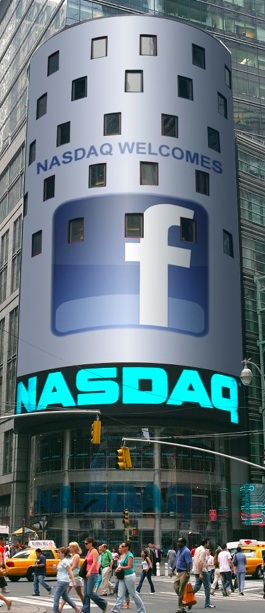Nasdaq OMX said it set aside $10 million to cover its “potential resolution” with the Securities and Exchange Commission of the Nasdaq Stock Market’s failure to properly carry out the initial public offering of Facebook stock to the public in May of last year.

The exchange operator said it accrued $10 million of potential expense for this “estimated liability,’’ in reporting its results for the first quarter of 2013.
The first quarter’s earnings, reported at $42 million, exclude both the potential Facebook penalty payment to the SEC as well as the $62 million it has accrued to compensation customers affected by its flawed launch of trading in Facebook shares. That plan was approved in March by the SEC.
In a post-mortem in early June of last year, Nasdaq said that a “race condition,’’ where a constant stream of modifications of orders came in, caused the delay in opening of trading in Facebook shares on May 18, its first morning as a publicly traded firm.
Members of the exchange also complained that some of their orders did not get placed as well. Nasdaq acknowledged a failure to deliver messages for executing trades, coming out of its IPO Cross system that precedes regular trading of a newly public firm’s shares.
The IPO Cross is designed to provide “fair executions” at a single price, maximizing volume in a stock and reflecting supply and demand. It also is designed to create an “open process in which all investors have the ability to enter orders” and participate as shares find their eventual price on the Nasdaq market itself.
Nasdaq said the ‘race condition’ surfaced in the first five minutes of trading and was exacerbated by switching over to a backup copy of its order matching engine
The money set aside for customers may not satisfy them. Citigroup and UBS each have filed claims against Nasdaq. Citi has said the botched IPO cost it $20 million. UBS said its losses reached $357 million.
Knight Capital Group, a market maker, took a pre-tax charge of $35.4 million for its trading in the flawed IPO.
Nasdaq’s $42 million of first quarter earnings came on $508 million in revenue. That compares to $85 million of net income on $580 million in revenue in the first quarter of last year.
Chief executive Robert Greifeld called the results “solid” in a period when “the volume environment remains challenging.”
Consolidated trading volume in all equities across all venues in March of this year was 6.1 billion shares, according to Nasdaq statistics. That’s down from 6.6 billion shares a year ago and 12.3 billion in March 2009.
The biggest drop this March came at the Nasdaq Stock Market , where volume was down 21.7%. Daily volume of 938 million shares was down from 1.2 billion shares a year ago.




